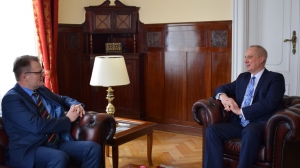Belarus, World Institute for Nuclear Security to more tightly cooperate

MINSK, 19 March (BelTA) – Belarus and the World Institute for Nuclear Security (WINS) intend to promote tighter cooperation. The relevant agreement was reached when Ambassador Extraordinary and Plenipotentiary of Belarus to Austria, Permanent Representative of the Republic of Belarus to International Organizations in Vienna Andrei Dapkiunas met with WINS Executive Director Lars van Dassen, representatives of the Belarusian embassy in Austria told BelTA.
Andrei Dapkiunas told Lars van Dassen about progress in the construction of the Belarusian nuclear power plant, about the persistent measures being taken in Belarus to ensure the security of nuclear materials and equipment. He also mentioned Belarus' cooperation with the International Atomic Energy Agency in this area.
Lars van Dassen has been in charge of WINS since January 2021. He shared his vision of priorities in the institute's future work. He also told Andrei Dapkiunas about current programs of the institute. Lars van Dassen expressed interest in advancing mutually beneficial cooperation with Belarusian institutions.
Andrei Dapkiunas and Lars van Dassen agreed to look into the possibility of establishing tighter cooperation between the relevant Belarusian organizations and the World Institute for Nuclear Security and its network of partner institutions.
The World Institute for Nuclear Security (WINS) was established in 2008 with assistance of the International Atomic Energy Agency (IAEA). WINS is a not-for-profit nongovernmental organization, which work is aimed at facilitating stronger nuclear security at the national level and the global one primarily by means of helping spread cutting-edge practices among nuclear security professionals. The institute acts as an international platform for sharing opinions and finding new ways to ensure the security of nuclear materials and other radioactive materials and equipment. Important directions of the institute's work include personnel training and the organization of educational programs. The institute is an official observer in the IAEA General Conference and its subcommittees on nuclear security.













